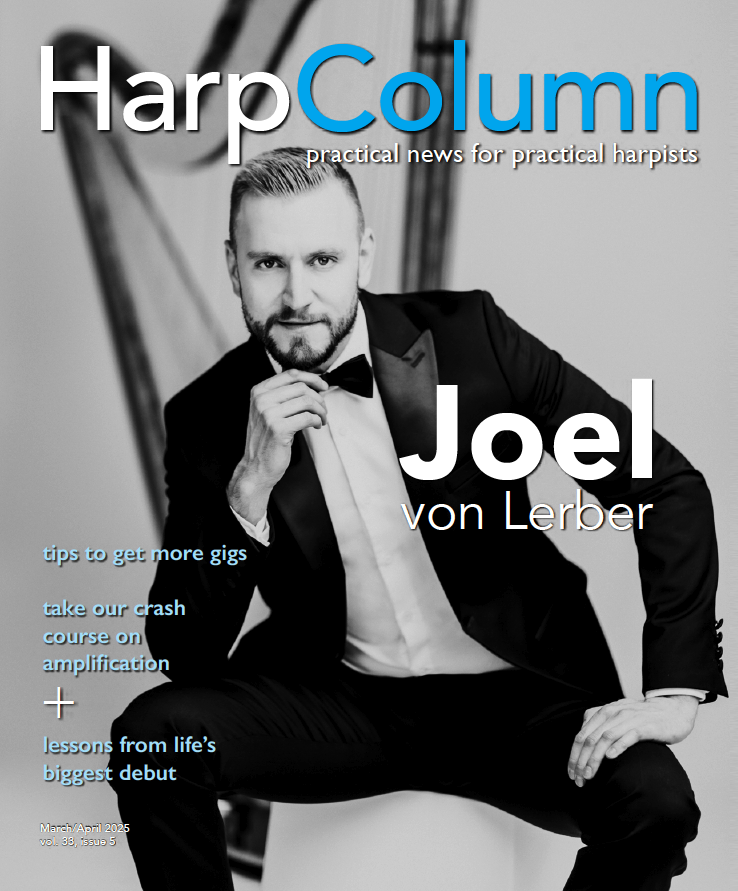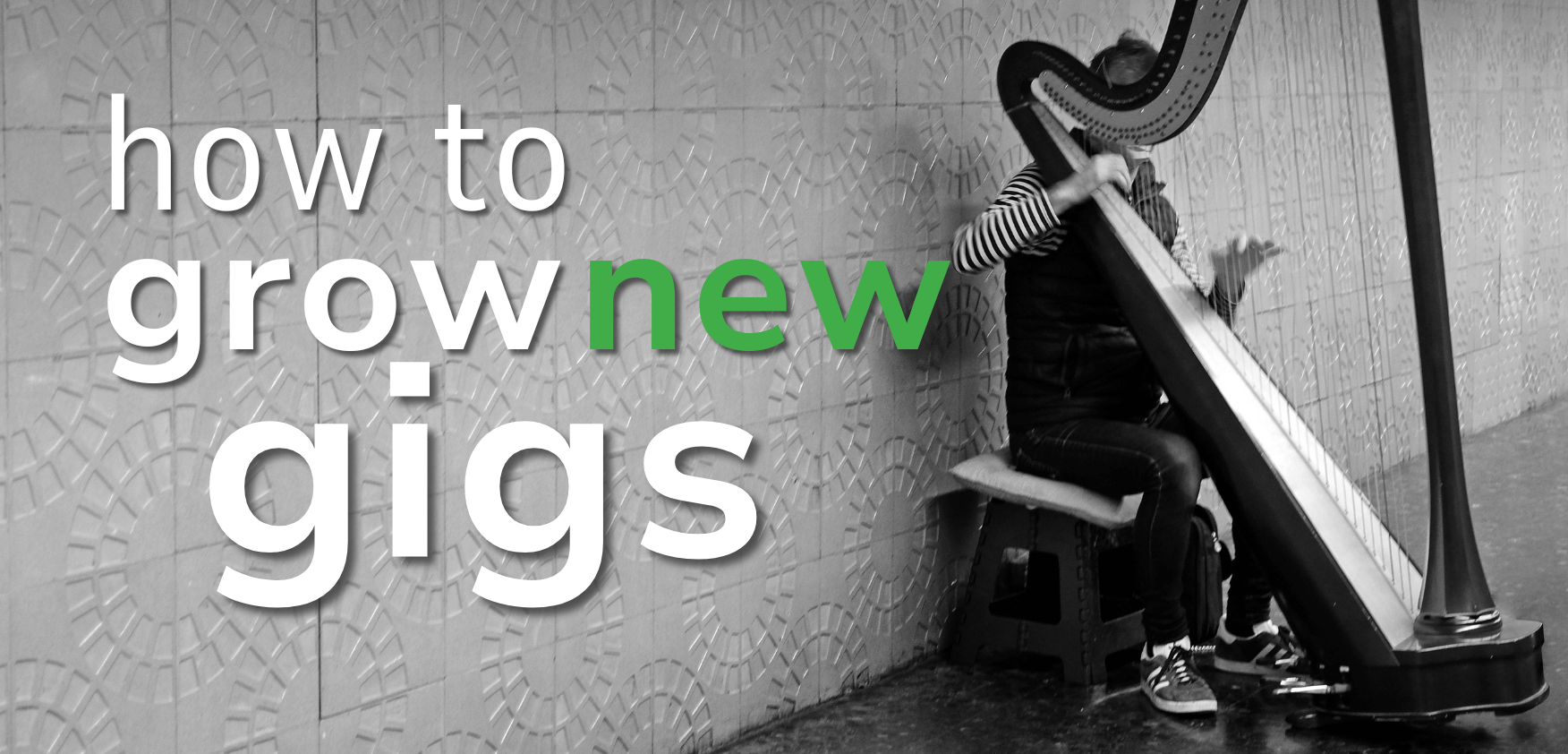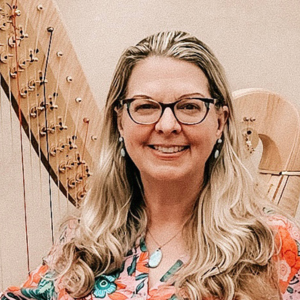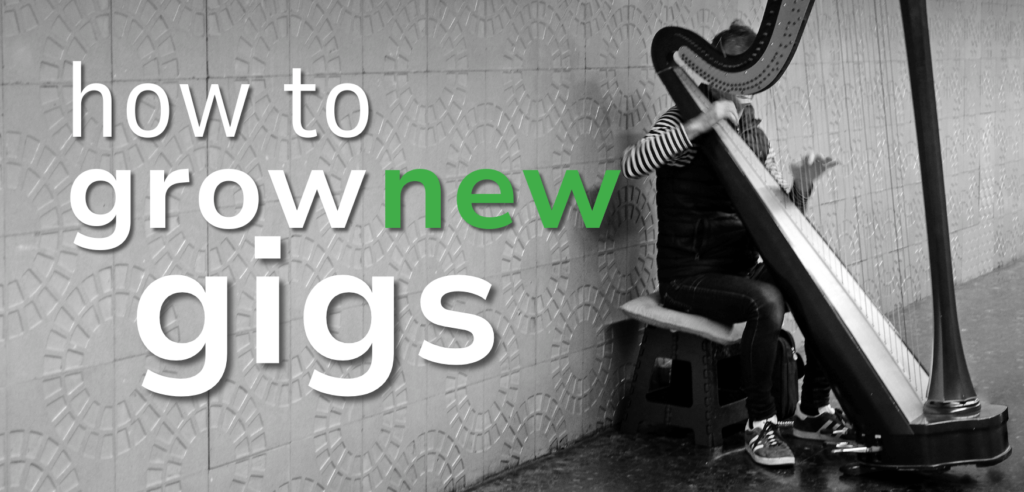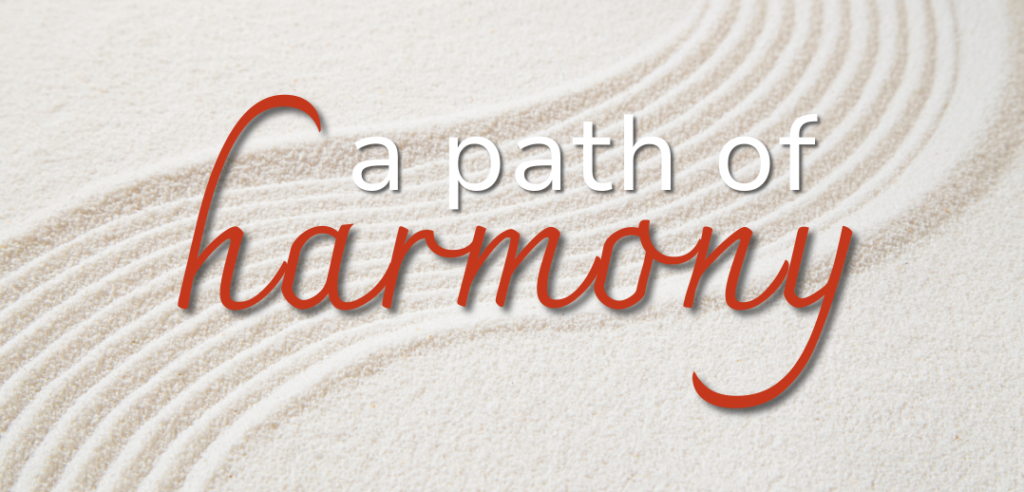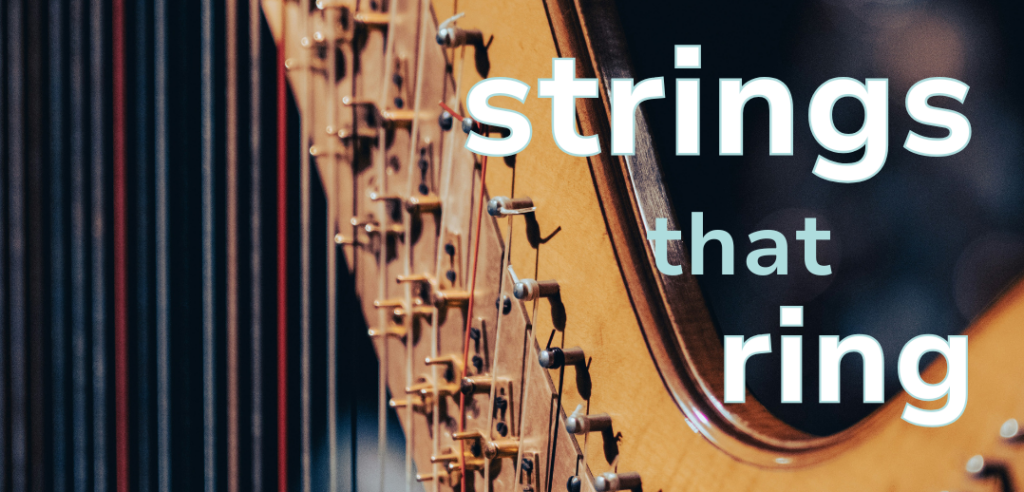“How can I grow my harp business?” This is a question you might ask yourself at different points in your life. Maybe after graduating from school, moving to a new city, or simply itching to spend more time with the harp, we seek guidance on how to make a living with the instrument we love.
Finding clear advice about how to do this can be a daunting process. Most harpists have far more experience playing the harp than growing their business. Some schools have started including music business classes, but they are usually a small fraction of a harpist’s education. Searching online can also be overwhelming with seemingly endless advertisements for courses, blog posts like “10 Ways to Achieve Fame and Fortune as a Musician,” and a cacophony of social media strategies. In addition, the online suggestions can sometimes feel impersonal and not in tune with who you are as a person and artist. Combine that with the ever-changing nature of technology, and it’s easy to feel overwhelmed and discouraged.
However, I would like to propose a slightly different, and more optimistic approach to growing your harp business. While I will detail current practical strategies for development, I would like to start by focusing on the “big picture,” which I am convinced can help us achieve long-term success while remaining true to our individual artistic visions.
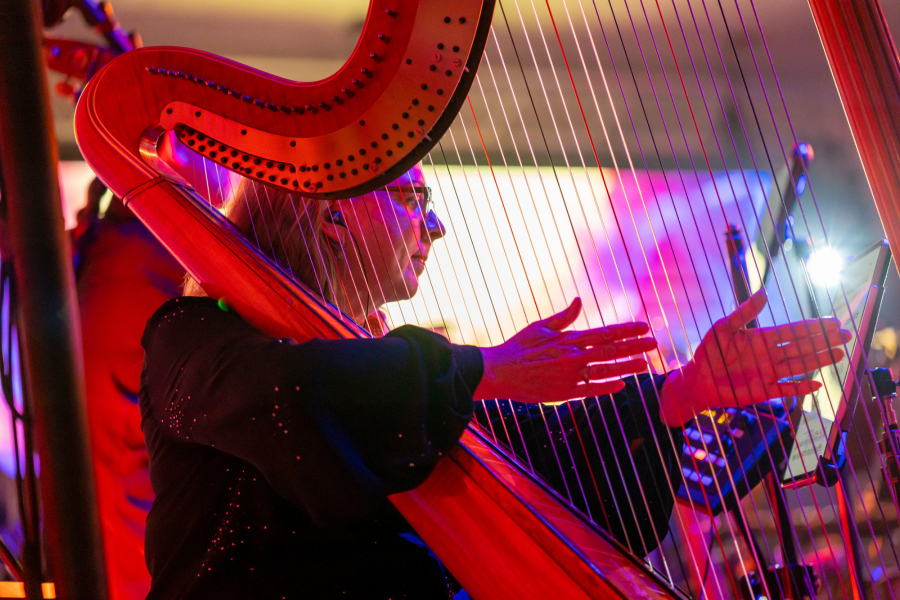
…having a good reputation as a person is as essential as being a good player…
The big picture
What do I mean by big picture? After a 40-year career in two very different cities, New York City and Miami, I am convinced that who you are (that is, your attitude and integrity) is as important, or in my opinion, even more important, than what you do. In other words, having a good reputation as a person is as essential as being a good player and will help you achieve a long-lasting and more satisfying career as a harpist.
This was a lesson I learned early on, thanks to several prominent New York City freelance harpists who took me under their wings when I first arrived there at age 19 with little business experience. It’s also a lesson I’ve seen play out frequently, in good and bad ways, in both New York City and Miami during the last 40 years. Time and again, it became clear to me that your attitude and integrity are directly linked to your career success and longevity.
Be positive
While walking backstage at the Gershwin Theater in New York City a few years back, I noticed a new sign on the head stagehand’s door: “Attitude is everything, pick a good one!” Since the music business involves working with other people, this advice is especially important. We all occasionally have bad days, but allowing them to create a negative attitude hinders collaboration and could lead to not being rehired. This is a crucial part of being a professional—being aware of our attitude and actively maintaining a positive, receptive mindset while working with others. In other words, being positive only enhances our interactions with others which in turn makes us more desirable to be around and more likely to be rehired. As one prominent contractor once shared with me, “I only hire good players who get along with others.”
Longtime New York City freelance harpist Sara Cutler (New York City Ballet, American Symphony Orchestra, Orchestra of St. Luke’s) agrees. “We all suffer from insecurities, crises of confidence, and even subconscious biases, especially as we are starting out,” she says. “Recognize this truth and understand how allowing these things to rule your behavior on the job can close you out of the best work or any work at all. On a job, take all direction with a smile, whether from a conductor or a colleague, and show your willingness to adapt, regardless of your personal feelings. If you are having fun on a gig, everyone around you will know you are, appreciate it, and want to work with you again. And did I say smile? Smile through everything. As the song says, ‘smile though your heart is breaking.’”
In addition to actively maintaining a good attitude, there are several other ways to develop a positive reputation as someone who has integrity and good people skills. Fortunately, my New York City harp mentors offered additional advice that has repeatedly helped me succeed.
Say yes
First, they recommended saying yes to all work offers, especially in the beginning. While negotiating, being paid well, and doing satisfying work are all important, there may be times when budgets genuinely do not allow a price you may have in mind, or the type of work might not appeal to you for whatever reason. However, if you’re available, say yes, prepare well, and keep an open mind. You never know what will come of it!
Early in my career, I happened to say yes to a last-minute call to sub with an orchestra at Carnegie Hall. They were scheduled to play Britten’s Young Person’s Guide to the Orchestra, a piece that we all practice from early on, but one that I had never played with an orchestra. Plus, it was in Carnegie Hall! In spite of my nerves, I agreed, and all went well. Coincidentally, an Austrian musical contractor happened to be in the audience, was impressed with my playing, and invited me to join a European tour of A Chorus Line for the summer. The tour was such a success that it turned into a world tour of three different Broadway shows over the course of the following two years. Saying yes led to the experience of a lifetime, traveling around the world playing music, and getting paid for it.
Stay humble
Sara Cutler attributes some of her early successes in New York City to this adage and offers additional advice: “Never think that anything is beneath you. Never predicate acceptance on how much something pays. Even if you think you cannot afford to do something, try to find a way. Every single gig, no matter how low-level or possibly miserable it may turn out to be, adds to your experience in a meaningful way. Every gig is also an opportunity to show off your skills to new people who may reappear later in your career with more opportunities for you.”
Have integrity
Other suggestions shared by my mentors centered around maintaining your personal and professional integrity. Always prepare well—be prepared for when the luck happens! Honor all commitments—no provisional booking until something better comes along. Practice the “golden rule”—treat others as you would like to be treated. Be a good colleague—no gossiping, undercutting, or backstabbing. Learn how to forgive others and move on if things don’t go as expected. Also helpful was a suggestion to find time for a personal life outside of music. This helps us keep things in perspective, especially during the challenging times in our career.
While these suggestions might seem obvious, my colleagues and I are often surprised when talented young harpists don’t achieve a high level of success. Sometimes it is because of their interpersonal style which usually includes neglecting one or more of these suggestions. On the positive side, being aware of the impact of our attitude and actions in advance can help guide us towards the career that we desire. Having a consistently good attitude and being a good colleague does not guarantee long-term success in your musical community, but it will certainly take you farther than without them.
Practically speaking
Now that we’ve covered the big picture, let’s get down to some practical strategies to grow your harp business. While technology will continue to change and fads come and go, I would like to focus on the more consistent things that I’ve learned over the years, many through trial and error.
Networking
Making music for a living involves collaborating with people—both fellow musicians and people who hire you to perform. Making yourself and your skills known is essential, but the way in which you go about this is important. Different cities or parts of the country can have different ways of conducting business. Ask people you trust what is acceptable where you live so that you are “in tune” with the local business culture. I noticed a big difference between what was acceptable networking behavior in New York City and in Miami, and it took me a little time to get my bearings in Miami since I didn’t know any of the other musicians very well when I moved there to teach at a university in 2019.
Here are some networking tips that I’ve found helpful throughout my career.
Contact local harpists. Understandably, when a new harpist moves to town, the locals can feel a bit anxious. Who is this person? Are they coming to “steal” our work? Are they nice, trustworthy, fun to hang out with?
Reaching out to other harpists is a great idea, but be clear about your intentions. If you’re there to freelance, remind them that you didn’t come to take their work but to sub for them as needed and to create your own musical life. This is what Katherine Honey did when she moved to Miami in 2012 from San Francisco where she was the regular harpist for fine dining and special events at the Palace and the Fairmont Hotels for 28 years.
After arriving in Miami, Honey hit the pavement, visiting every major hotel in the area, and convinced the managers at the Biltmore Hotel in Coral Gables (a Miami neighborhood) to hire her to play for their afternoon tea service five days a week, year-round. She has been there for about 10 years now and has created more work for others by inviting them to sub when she needs to take off. In addition to the initial extensive legwork, Honey says she made a point of telling the local harpists that she wasn’t there to steal their work. “I’m just here to create more work for all of us. As Anne Adams used to say, ‘There’s a place for everyone in the harp world.’”
My experience when I first moved to New York City was a bit different. I was 19 years old and had won the audition to play with the National Orchestral Association, a training orchestra that was similar to today’s New World Symphony. The fellowship included weekly lessons which allowed me to study with many of the major harp teachers in New York City at the time. It also gave me time to attend performances in the city and to meet a number of freelance harpists.
Being a “working student” allowed me to get to know the harp community in a non-threatening way and made for an easier return to the city after I finished my doctoral degrees a few years later. Since other harpists already knew me and what I could do, they started asking me to sub for them on Broadway and in freelance orchestras. Through consistent quality work and a good attitude, I started developing a positive reputation, which led to more work and then to big jobs, such as the harpist at “Wicked,” four tours with Barbra Streisand, and the Hamilton Broadway cast recording.
Things were different when I moved to Miami in 2019 to teach full-time at a local university. I shared with the local harpists that I was there to teach and to help them out with performing if needed. Covid arrived soon thereafter, but once performances started back up in 2021, the contractors began calling me to play with their freelance orchestras because of my reputation and experience. (A prominent harpist who was doing most of this work also left town during this time.) And I suspect that my ability to consistently play well, while maintaining a positive attitude and being a good colleague, helped contribute to being rehired every year since.
Be a part of the harp community. Join a local chapter of the American Harp Society and go to its functions. Help coordinate group recitals with other teachers. Be creative, active, and helpful. You likely won’t click with every harpist you meet, but look for those who share your positive mindset and be intentional about connecting with them.
Cast a wide net for gig venues. In addition to contacting high-end hotels, try reaching out to prominent restaurants, event spaces, event managers, schools, church music directors, other musicians, assisted living centers, hospitals, and high-end stores (jewelry, cosmetics, and body products). Get in touch with photographers, florists, caterers, and other professionals who work at special events.
Brother Mark Spencer, music director of Saint Patrick Catholic Church in Miami Beach (as well as its harpist, organist, and vocal soloist), says, “There is an abundance of work for harpists in the church circuit regardless of denomination. I always hire two harps to play during the Thanksgiving, Christmas, and Easter holiday seasons. Since I am very particular about who I want sitting behind the harps, I always look for excellent musicians who have positive attitudes.”
Find a niche. Here’s your chance to create something new, perhaps something you’ve always wanted to explore. Maybe it’s starting a chamber group, playing new music, learning different kinds of music on the harp, or playing a different kind of harp. Do something that will make you happy and, hopefully, lead to work.
Share work. If you can’t do something, contact a harpist who has given you work. Recommend your colleagues. Thank others who recommend you!
Handle with care. Deciding whether to contact local contractors or not can be a tricky decision. Check with your local musician friends about this question. For example, in New York City, I was told to never contact a contractor. They hear about musicians through their work as a sub for others. In South Florida, since the music scene is more fragmented and all freelance, local musicians recommended that I contact contractors, and several offered their names as recommenders on my behalf. Make sure you understand the local protocol before contacting contractors.
Set fair rates. Another area of care is determining how much to charge for harp jobs. Most orchestra jobs in New York are union, and the rates are posted on their website for members to reference. However, a lot of special event work in many places is not determined by the union, so finding out what the going rates are can be tricky. It is good to know approximately what others are charging, but be careful to not collude with other harpists. (This is illegal.) Do your best to find a ballpark figure, and try not to undercharge, in particular, as this is unfair to everyone.
Be professional. At the risk of repeating myself, being a good colleague and getting along with others goes a long way towards helping with networking. Spencer agrees. “If a musician is exceptionally talented but has an unprofessional attitude, I will not hire that person. And I never recommend anyone who isn’t a good colleague, as this may reflect back on me as well.”
Branding
EPK IN ACTION
Want to see an example of a good electronic press kit? Check out:
- Calvin Arsenia (calvinarsenia.com/about)
- Lara Somogyi (www.larasomogyi.com/home/press)
Creating consistent and recognizable branding for yourself will help you stand out from the cacophony of the internet. I knew my branding was working when other musicians in south Florida started asking me if I was the “busytuning” harpist. (“Busytuning” is in my email address, website name, and my social media handles.)
Branding can take the form of a logo, quality professional photos, a website, business cards, or even an EPK (electronic press kit).* Check out Harp Column’s four-part series on creating all of the elements for your electronic press kit. [Ed.—Read the Build Your Brand series that appeared in four subsequent issues beginning in the September/October 2023 issue.] The time you spend learning tech basics is an investment in your harp business, and it can be creatively satisfying.
Social media
Whatever your opinion about social media, it can be a useful tool for growing your harp business. Sharing your brand with the different platforms can help spread the word about your abilities and experiences. Here are a few basic tips:
Social sites: Instagram can be a popular place for getting work. Lisa Kikol, a longtime special events harpist in South Florida, says that she gets a significant amount of her work from her Instagram account (@harpfortlauderdale). Her advice for getting noticed is to post frequently, use hashtags, and follow other professionals in the special events business, such as photographers, caterers, and other musicians.
Other harpists have noticed that they get more inquiries when they post videos of themselves playing at special events, but be careful with this. The priority should always be on the current client and not distracting from that event by taking videos for future use.
Facebook is a great way to connect with other harpists and musicians, but many harpists I spoke with said that they are more likely to get harp students than harp jobs from Facebook. However, it can be exciting to see what other harpists around the world are doing.
TikTok is another platform to connect with potential clients and is particularly popular among younger people. Check out the accounts of Kristan Toczko (@harpistkt) or Madison Calley (@madisoncalley) to see how effective the platform can be for harpists.
Content sharing tools: For video and audio content, there are several sites that help potential clients access your work. And to help organize the multiple links to your sites, a “link in bio” tool can be very helpful.
This is especially true on Instagram where only one link is permitted in the bio section of your account. This spot is coveted since visitors know to look there for your latest work. Using a link in bio tool such as Hopp by Wix or Linktree allows you to share all of the links to your sites in one place. You can also share it on Facebook (in the intro section) or send it to potential clients during negotiations. Think of it as a “one stop shopping” page with links to all of your work that you can easily control and update.
Creating a YouTube channel is an easy and great way to share videos of your playing. Having one place for others to access your work is a free and convenient way to publicize yourself. There are ways to make money from your YouTube channel, but the process can take some time.
I recently started a video series and put my free videos about “all things harp” on YouTube. And for my teaching videos, such as how to play specific Bach works on the harp, I use Vimeo OTT. This platform allows users to easily purchase or rent whichever videos they are interested in.
SoundCloud is a great site to host audio-only content. Creating a channel there isn’t necessarily as important as the video channels, but it is a useful place when you don’t have video to share with your audio. (It’s also a good spot to host your podcast!)
Entrepreneurial skills



While music schools train us to be performers, and sometimes also as teachers, we rarely receive instruction about how to create additional income sources. Wearing multiple “harp hats” takes some effort and creativity, but it can potentially lead to monetizing harp-adjacent skills. Start by focusing on topics that pique your curiosity. After some inevitable groundwork, you’ll be on your way to becoming an entrepreneur with potential multiple sources of income. Here are just a few examples of what harp entrepreneurs are doing.
Boston-based jazz harpist Felice Pomeranz, professor of harp at the Berklee College of Music, started her music booking agency Gilded Harps over 30 years ago. It has grown to include partnering with other special events businesses and providing live music in New England and beyond.
Dutch harpist Gwyneth Wentink also wears multiple harp hats. In addition to being an internationally acclaimed harpist of classical and experimental music, she has initiated various interdisciplinary productions for Foundation Harp, which she founded in 1999, and is a professionally certified coach and a qualified yoga instructor.
Kiki Bello is a Miami-based Colombian singer-songwriter, harpist, and music business entrepreneur who is a pioneer in introducing the electric harp into the Latin music industry. Her videos have collected more than 150 million views on social media.
Personally, I didn’t set out to be an entrepreneur after college. Organically, my curiosity and passion for the harp led me to investigate various harp interests and eventually, after a lot of learning and hard work, took me to some interesting places. I explored writing about the harp for various publications, editing three issues of The American Harp Journal, starting a harp music publishing company (Gotham Harp Publishing), and giving Bach masterclasses and lecture-recitals at harp conferences around the world. Recently, I started a conservatory-style, online teaching studio, the Sherman Harp Studio. It has been a wonderful way for me to create a new harp community after leaving academia in December 2023.
However much income side jobs bring in, there can be great satisfaction in working with people in the music business who we might not have otherwise and in seeing our hard work come to life.
Bottom line, think about what interests you and see where your passions take you. I never imagined I’d become involved in so many things. I simply followed my curiosity and my love for the harp everywhere that it took me.
Keep it simple
I am especially guilty of engaging in information overload. I love words and sharing, but in today’s age of instant communication, less is usually more. Try to be succinct out of respect for your viewers’ time. And likewise, try to avoid posting poor content. (“When in doubt, leave it out.”) Try to share your content regularly and keep your information updated. All of these things show you care and have pride in your work which are qualities a potential employer will want to see.
While all these things take time and effort, the results are worth it and hopefully provide you with more exposure and potentially more work.
Consistent growth
Growing your harp business takes consistent work. But it’s an investment in something you can be proud of. I like to think of it as a way to share all of my experiences and hard work with other harpists, which gives me great joy. I see in fact that my harp business continues to grow as a by-product of my passion, not as the main intention behind my hard work. This might be something to keep in mind: lead with your head and heart and not exclusively from your pocketbook.
You can’t build a freelance career overnight—it takes years of intentional work and care. While I’ve always tried to follow my mentors’ suggestions, I didn’t always succeed. And yes, like many of us, I have experienced some huge setbacks. Yet I always seem to find my way back on track by remembering the big picture.
As you are working through these strategies to build your business, always keep one eye on the big picture. Be positive, say yes, stay humble, and have integrity—focusing on who you are rather than what you do will lead to authentic and sustainable growth in your harp business. •




